7th Grade Ss Pass Review Guided Reading Answers
Information technology's so important to stop frequently during your lessons to bank check for understanding with your students. Afterward all, is in that location a worse feeling than being met with blank faces after you've delivered an entire lesson? Use these strategies throughout the twenty-four hour period to make sure everyone is on track. Here are twenty fun and simple ways to see who's skilful to get, who's almost at that place and who needs some one-on-one.
i. Use technology.
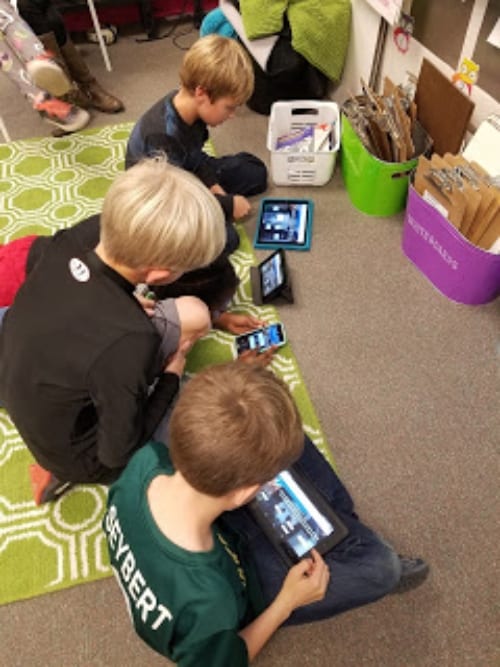
Source: The Principal Peach
Ane of the quickest ways to cheque for understanding is to accept your kids hop on their device and use 1 of the awesome tech tools like Quizlet, Kahoot or Google forms to show what they know.
2. Ask open-concluded questions.
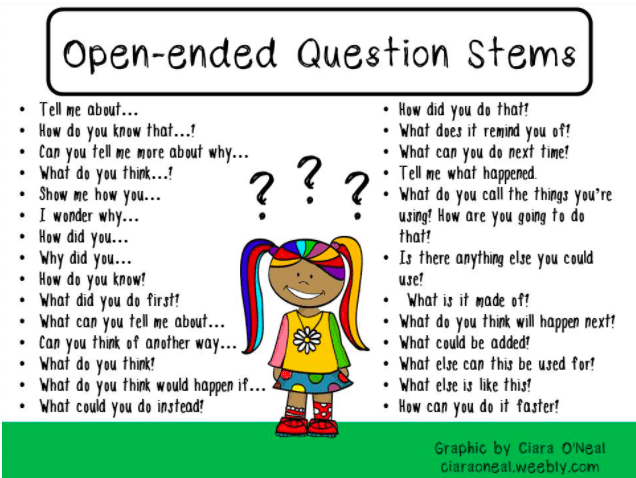
Source: Ciara O'Neal
If you ask yes/no questions to bank check for understanding, some students may default to yeah considering they don't want to admit that they're not quite there withal. Asking open-concluded questions requires a little more thought and helps draw out where they really are.
three. Inquire students to give a concrete response.

Epitome source: YouTube
This can be a fun manner to finish a lesson, and students love it! Inquire students to do something like put their hands on their head for yes and stand on i leg for no. Or enquire a question and tell students to handclapping once if the answer is true and practice jazz hands if it is false. Use your imagination and change it up each fourth dimension.
four. Use emojis.
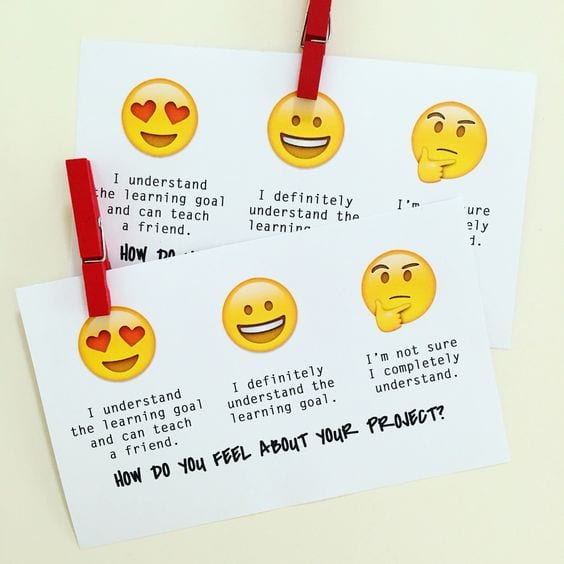
Source: Teach and Shoot
Prepare cards to leave at students' desks similar the ane to a higher place. Let students adhere their clips to show their level of understanding.
5. Ask questions "on the fly."
Stop frequently to enquire questions every bit you go through your lesson. Encounter if students can make connections, define words, answer questions and explain concepts. Make information technology a natural part of your process so that your students volition know they are coming and pay attention.
6. Use checkmarks.
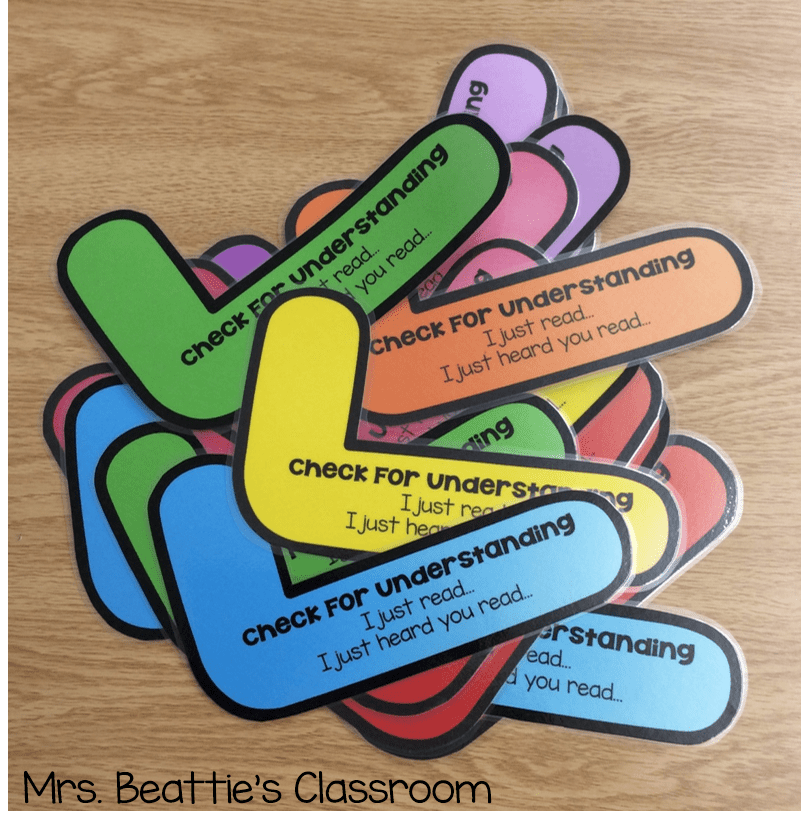
Source: Mrs. Beattie'south Classroom
Accept a folio out of The Daily Five's volume and create these checkmarks to assistance your students remember to check for understanding as they read.
vii. Testify your thumbs.

Source: Shutterstock
Sometimes all information technology takes is a quick thumbs up or thumbs downwardly (or even thumbs sideways) to make sure your students are all yet on board. Finish frequently to check in and have your students hold them upwards high so you can accept account.
8. Use go out tickets.
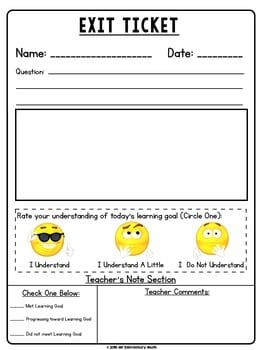
Source: Mr. Unproblematic Math
Download this cute freebie to create these exit tickets. Students can write the question of the solar day at the top and plough in their responses on the manner out.
nine. Flash whiteboards.
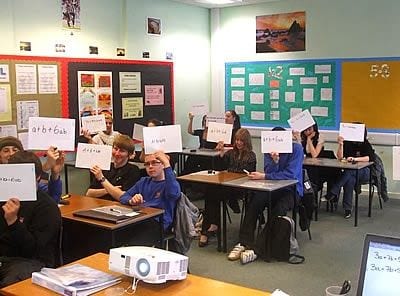
Paradigm source: Pinterest
Ask one quick question that shows students are keeping up and take them write their answers on individual whiteboards. Practise a quick sweep before they put them down. Pull any students together that still need more and re-teach.
10. Give it a 4-finger rating.
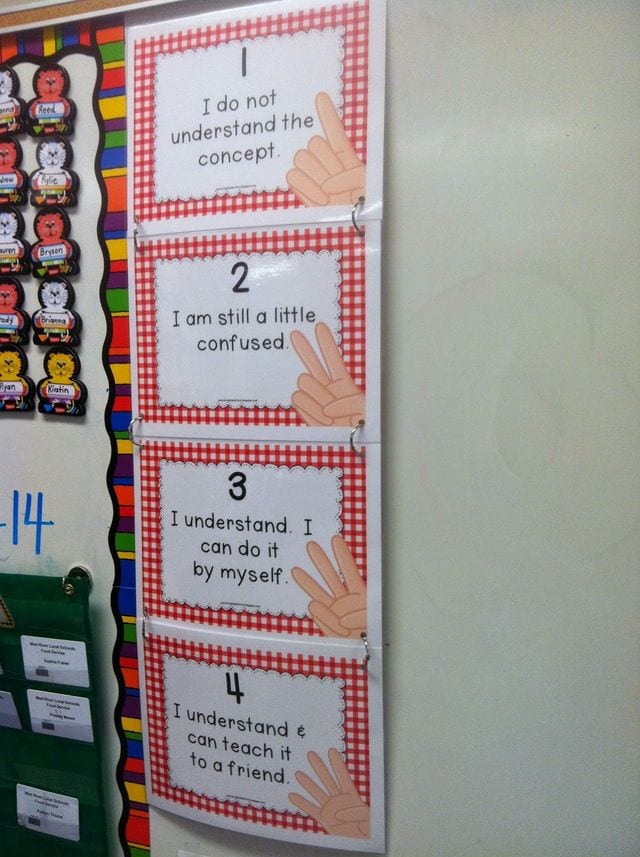
Source: Mrs. Wheeler'southward First Class Tidbits
Teach your students this quick check method and check in often to come across where everyone stands. Pair up students who flash a 3 or four with students who flash a 1 or ii.
11. Do a Quick Write.

Source: Sly Flourish
Inquire simply 1 question and have students jot a quick paragraph on an index bill of fare to show that they understand. Have them share their reply with a partner or collect the cards to review for the next twenty-four hour period.
12. Post your name on the terminate sign.
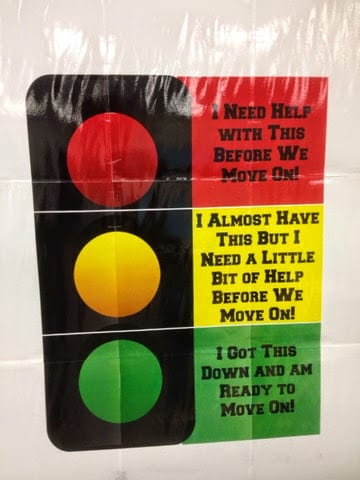
Source: Musings From the Middle School
This teacher blogger asks students to bank check for understanding by writing their proper name on a mail-information technology, then attaching information technology to the stoplight on the appropriate colour. She and then groups students who need re-teaching and advises students who are prepare to move on.
13. Give them a Yes/No question.
Check for agreement by asking students to wink a cherry-red piece of construction newspaper for no (they demand a little more explanation) or a green slice of construction paper for yeah (they go information technology and are prepare to motility on). Alternatively, laminate squares of ruby-red and green construction newspaper and gum them back to back to large popsicle sticks to make paddles for your students to bear witness.
14. Do a self-cess.
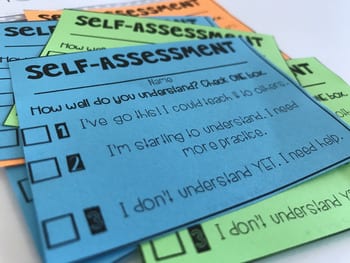
Source: Not So Wimpy Teacher
Download this free resource and print up a stack of cocky-assessment cards in dissimilar colors for dissimilar subjects. Pass them out as exit tickets to plan for the next lesson period.
fifteen. Describe a T-nautical chart.
Ask your students to tell you lot 5 (or whatever number you call back is sufficient) things they learned from the lesson. Take them make a T-chart and on the left-mitt side write a fact or opinion, and on the right side, give evidence to support their fact or opinion.
16. Do a quick sort.
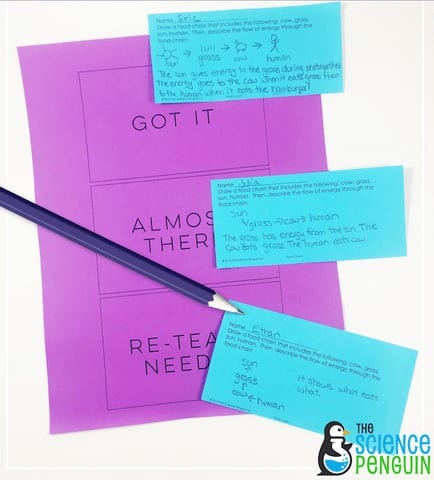
Source: The Scientific discipline Penguin
Inquire one question that you feel shows an understanding of the concept you lot are teaching. Have students write their answers on cards and collect them. Sort cards into piles: Got it, Most At that place, and Re-Pedagogy Needed. Divide students into groups based on their answers and go on teaching.
17. Selection a card, whatsoever card.
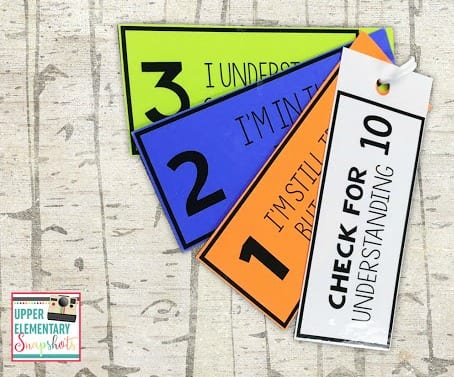
Source: Upper Uncomplicated Snapshots
Print these free cards, laminate them, and connect them together with a ring or twist tie. Give one copy to each student to keep on their desk. When it comes fourth dimension to check for understanding, students can just flip to the appropriate bill of fare, and you can do a quick bank check by color to see who nevertheless needs assistance.
18. Display mini flip charts.
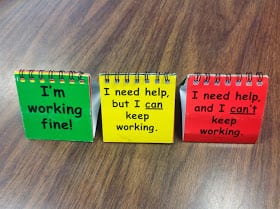
Source: The Simple Math Maniac
Brand your ain or if you lot're non the crafty sort, buy 12 of these desktop flip charts for $16.49 from Really Great Stuff.
19. Use cooperative learning structures.



Source: quaternary Grade Racers
This teacher/blogger uses cooperative learning structures to cheque for understanding in a fun and engaging manner.
xx. Reference this chart.
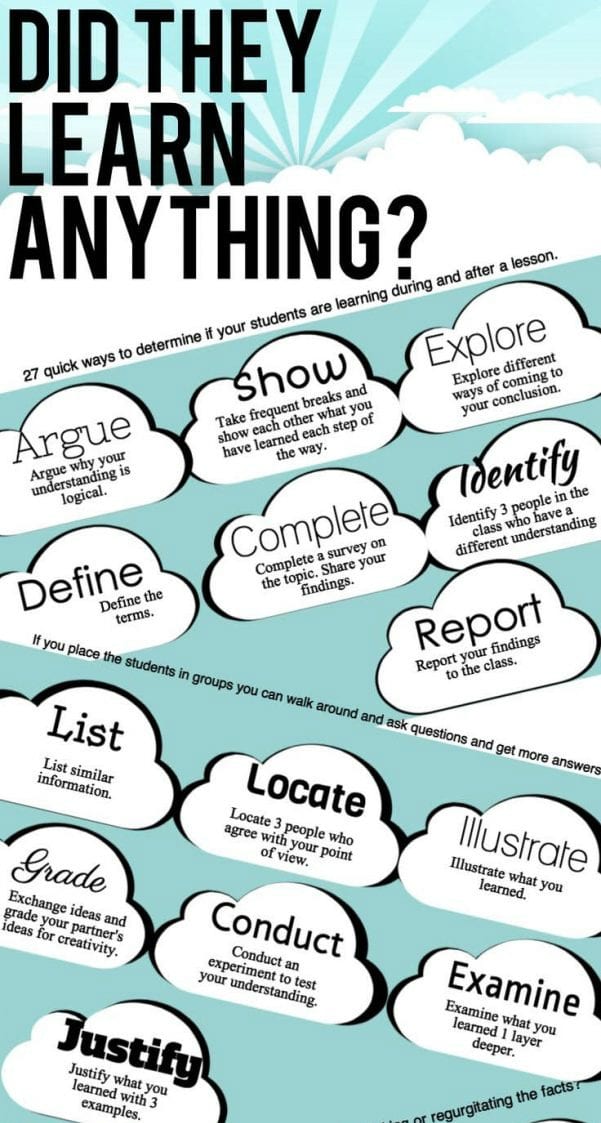
Source: Mia MacMeekin
This amazing infographic shows all kinds of imaginative means to bank check for understanding. Print out a copy and display it in your classroom for inspiration.
What are your favorite ways to bank check for agreement? Share in the comments below. Plus, fifteen means to know when your students aren't "getting" it.
Plus, be sure to subscribe to our newsletter for more slap-up ideas!
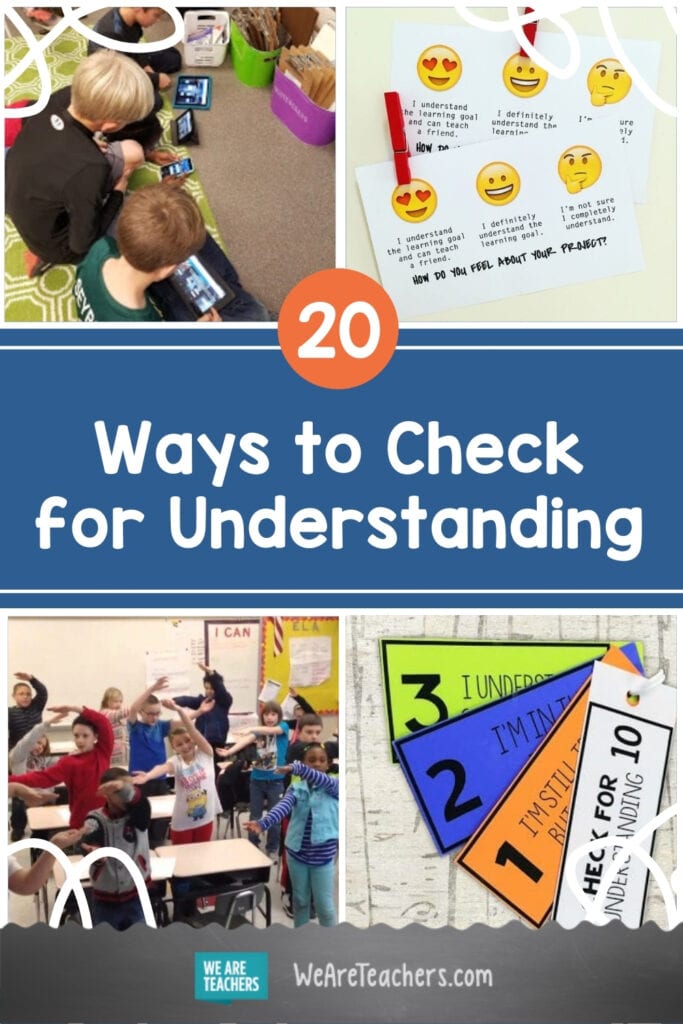
Source: https://www.weareteachers.com/ways-to-check-for-understanding/
0 Response to "7th Grade Ss Pass Review Guided Reading Answers"
Post a Comment